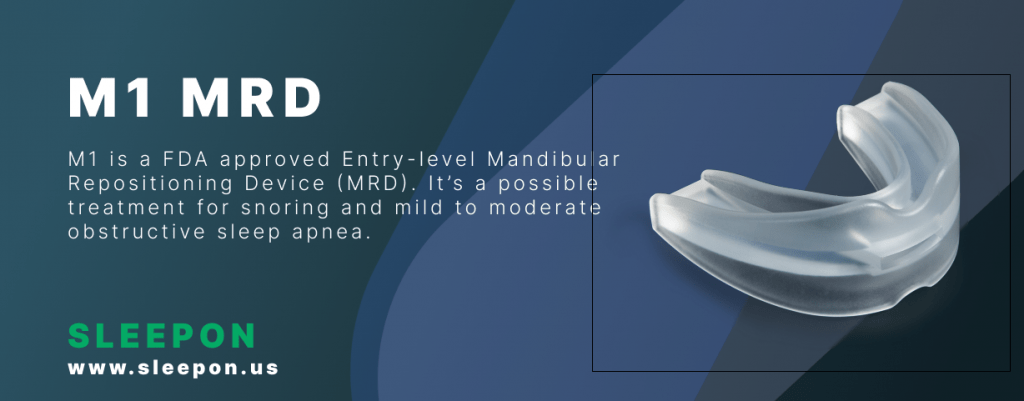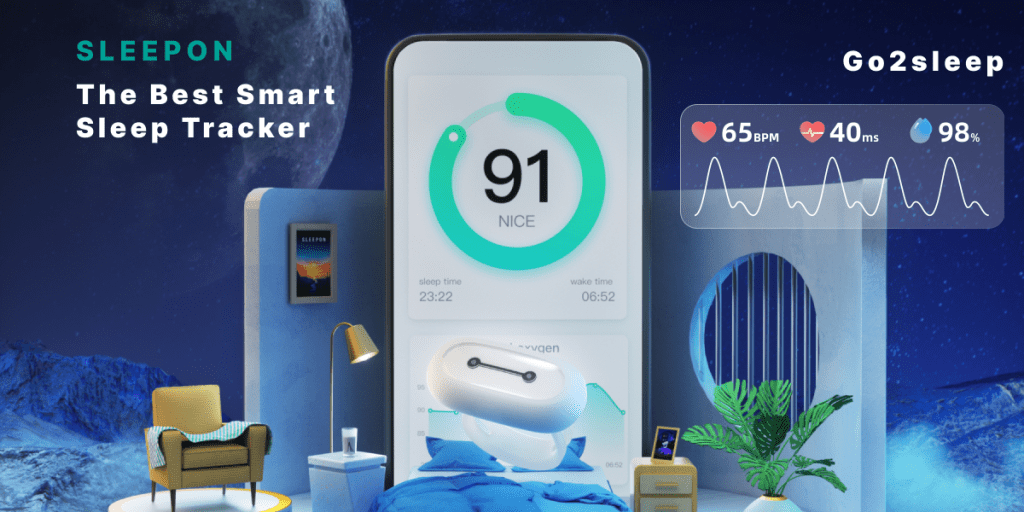
Snoring: Causes & Treatments – SLEEPON BLOG
Article outline
Click : What Causes Snoring?
Click : When Should You See a Doctor About Snoring?
Click : What Treatments Can Help Stop Snoring?
What Causes Snoring?
Snoring is a common condition that occurs when the flow of air through the mouth and throat is partially obstructed during sleep. There are several factors and underlying causes that can contribute to snoring, including:
-
Obstructive Sleep Apnea (OSA)
OSA is a serious sleep disorder characterized by repeated interruptions in breathing during sleep. It often leads to loud snoring as the airway becomes partially blocked, causing the tissues in the throat to vibrate. OSA is a significant cause of chronic snoring.
-
Anatomy of the Mouth and Throat
Certain anatomical factors can make individuals more prone to snoring. This includes having a narrow airway, enlarged tonsils or adenoids, a large tongue, or a deviated septum.
-
Obesity
Excess body weight, especially around the neck area, can put pressure on the throat’s tissues and narrow the airway, leading to snoring.
-
Age
As people get older, the throat muscles tend to become more relaxed and lose tone, making them more likely to collapse during sleep and cause snoring.
-
Alcohol and Sedative Use
The consumption of alcohol, sedatives, or muscle relaxants before bedtime can relax the throat muscles, increasing the likelihood of snoring.
-
Sleep Position
Sleeping on your back can cause the tongue and soft palate to collapse to the back of the throat, obstructing the airway and resulting in snoring. Sleeping on your side may reduce snoring in some cases.
-
Nasal Congestion
Nasal congestion due to allergies, colds, or sinus problems can force individuals to breathe through their mouths, which can lead to snoring.
-
Smoking
Smoking irritates the throat’s tissues and can lead to inflammation and increased snoring.
-
Sleep Deprivation
Not getting enough sleep on a regular basis can relax the throat muscles and contribute to snoring.
-
Pregnancy
Hormonal changes during pregnancy can lead to nasal congestion and increased snoring in some women.
-
Medical Conditions
Certain medical conditions, such as hypothyroidism, polycystic ovary syndrome (PCOS), and acromegaly, can contribute to weight gain and throat tissue changes, which may lead to snoring.
-
Genetics
Some individuals may be genetically predisposed to snoring due to inherited anatomical features or susceptibility to certain sleep disorders.
It’s important to note that snoring can vary in severity, and occasional snoring may not necessarily indicate a serious underlying condition. However, chronic and loud snoring should be evaluated by a healthcare professional, as it could be a sign of a more significant sleep disorder, such as sleep apnea, that requires medical attention and treatment.

When Should You See a Doctor About Snoring?
While occasional snoring is common and typically not a cause for concern, there are specific situations when you should consider calling a doctor or a healthcare professional:
-
Loud and Persistent Snoring
If your snoring is extremely loud and persistent, to the extent that it disrupts your sleep and the sleep of others in your household, it’s a good idea to seek medical advice. Loud snoring can be a sign of a more serious underlying condition like sleep apnea.
-
Pauses in Breathing
If you or someone you sleep with notices that your snoring is accompanied by pauses in breathing, choking, or gasping sounds during the night, this could be indicative of obstructive sleep apnea (OSA). OSA is a potentially serious sleep disorder that requires medical evaluation and treatment.
-
Daytime Fatigue and Sleepiness
If your snoring is associated with excessive daytime sleepiness, fatigue, difficulty concentrating, or other symptoms of sleep deprivation, it may be a sign that your snoring is affecting your sleep quality. This could be due to a sleep disorder, and you should consult a healthcare professional for evaluation.
-
Witnessed Apneas
If someone observes that you stop breathing during your sleep and then startle awake with a gasp or choking sound, this is a strong indication of sleep apnea. Seek medical help promptly, as untreated sleep apnea can have serious health consequences.
-
High Blood Pressure
If you have hypertension (high blood pressure) that is difficult to control, and you snore loudly or have other symptoms of sleep apnea, it’s essential to discuss this with your doctor. Sleep apnea can contribute to hypertension and increase the risk of cardiovascular problems.
-
Morning Headaches
Frequent morning headaches, especially when accompanied by loud snoring and other sleep-related symptoms, may be linked to sleep disorders like sleep apnea and should be evaluated by a healthcare provider.
-
Unintended Weight Loss
If you experience unexplained weight loss along with loud and persistent snoring, it’s crucial to consult a doctor. Weight loss combined with other symptoms can be indicative of an underlying medical condition.
-
Worsening Snoring with Medication
If you notice that your snoring has become more pronounced after starting a new medication, especially if it’s a sedative or muscle relaxant, inform your healthcare provider. They can assess whether the medication is contributing to your snoring and recommend alternatives.
-
Partner Concerns
If your snoring is causing concern or distress to your sleep partner, it’s worth discussing with a healthcare provider. Your partner’s observations can provide valuable insights into the severity and impact of your snoring.
Remember that snoring can vary from person to person, and its causes and implications can be diverse. If you’re unsure whether your snoring warrants medical attention, it’s best to consult a healthcare professional or a sleep specialist. They can assess your specific situation, conduct necessary evaluations, and recommend appropriate treatments or interventions to improve your sleep quality and overall health.

What Treatments Can Help Stop Snoring?
The treatment of snoring can vary depending on its underlying causes and severity. Here are several approaches and treatments for snoring:
-
Lifestyle Modifications
-
Sleep Position
Sleeping on your side instead of your back may reduce snoring for some individuals. Special pillows or devices can help encourage side-sleeping.
-
Weight Management
Losing excess weight, particularly if you are overweight or obese, can reduce or eliminate snoring, as it may reduce the fatty tissue in the throat that contributes to airway obstruction.
-
-
Avoid Alcohol and Sedatives
Refrain from consuming alcohol, sedatives, muscle relaxants, or any substances that relax the throat muscles close to bedtime, as these can contribute to snoring.
-
Treat Allergies and Nasal Congestion:
Allergies and nasal congestion can lead to mouth breathing, which can increase the likelihood of snoring. Over-the-counter or prescription allergy medications, nasal sprays, or allergy treatments may help.
-
Hydration
Staying well-hydrated can prevent excessive throat dryness, which can make snoring worse. Drink plenty of water throughout the day.
-
Avoid Heavy Meals and Late-Night Eating
Eating large, heavy meals or snacking close to bedtime can lead to indigestion and increased pressure on the diaphragm, potentially worsening snoring.
-
Oral Appliances
Dental devices or oral appliances can be prescribed by a dentist or sleep specialist to help reposition the jaw and tongue to keep the airway open during sleep. These are particularly effective for snoring caused by mild to moderate sleep apnea.
-
Continuous Positive Airway Pressure (CPAP)
CPAP therapy involves wearing a mask over the nose or both nose and mouth that delivers a continuous flow of air pressure to keep the airway open. CPAP is the primary treatment for moderate to severe obstructive sleep apnea, which often includes loud snoring.
-
Surgery
Surgical options are typically considered when snoring is caused by structural issues in the airway, such as enlarged tonsils, a deviated septum, or excess tissue in the throat. Surgical procedures may include:
- Uvulopalatopharyngoplasty (UPPP): Removal of excess tissue from the throat.
- Septoplasty: Correction of a deviated septum.
- Tonsillectomy: Removal of the tonsils.
- Genioglossus Advancement (GA): Repositioning the tongue attachment to prevent airway collapse.
- Palatal Implants: Placing small implants in the soft palate to stiffen it and reduce vibration.
-
Radiofrequency Ablation (RFA)
RFA is a minimally invasive procedure that uses radiofrequency energy to shrink and stiffen the tissues in the throat, reducing snoring.
-
Laser-Assisted Uvulopalatoplasty (LAUP)
LAUP uses lasers to remove or reshape the uvula and soft palate, creating more space in the throat and reducing snoring.
-
Neuromuscular Electrical Stimulation (NMES)
NMES devices can be used to strengthen the muscles in the throat, which may help reduce snoring.
It’s important to note that the choice of treatment should be based on a proper diagnosis of the underlying cause of snoring. Consulting a healthcare professional or a sleep specialist can help determine the most appropriate treatment for your specific situation. Additionally, lifestyle modifications, such as maintaining a healthy weight and avoiding alcohol and sedatives, are often recommended in conjunction with other treatments to improve the effectiveness of snoring management.
Comments (4)
Leave a Reply Cancel reply
ALL ARTICLES
Subscribe Us
403A, Building A2, Zhihui Park, Fuyong Street, Bao'an District, Shenzhen, Guangdong, China
Products
Company
Copyright © SLEEPON. All rights reserved.
SLEEPON keeps both Sleeponhealth and Sleepon.us due to the brand upgrading. We promise to provide the same products and service in both sites.








prescribed medication for stomach pain purchase avalide online
Simply desire to say your article is excellent. The clearness in your post is simply excellent, and I could assume you are an expert on this subject. Fine with your permission, let me grab your feed to keep up to date with forthcoming posts. Thanks a million, and please carry on the gratifying work.
[…] Snoring: Causes & Treatments – SLEEPON BLOG […]
I loved as much as you will receive carried out right here. The sketch is tasteful, your authored subject matter stylish. nonetheless, you command get got an edginess over that you wish be delivering the following. unwell unquestionably come further formerly again as exactly the same nearly very often inside case you shield this hike.